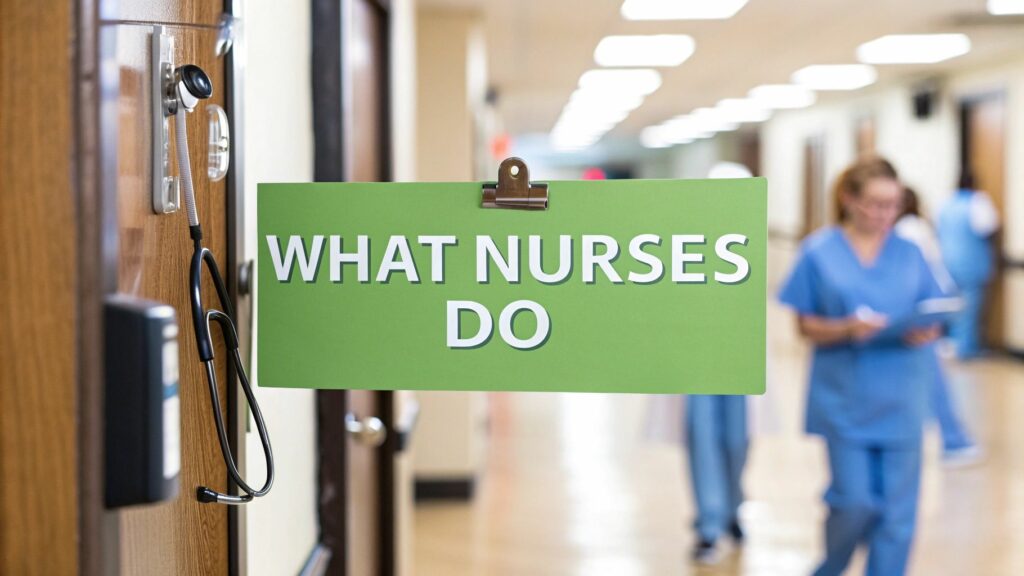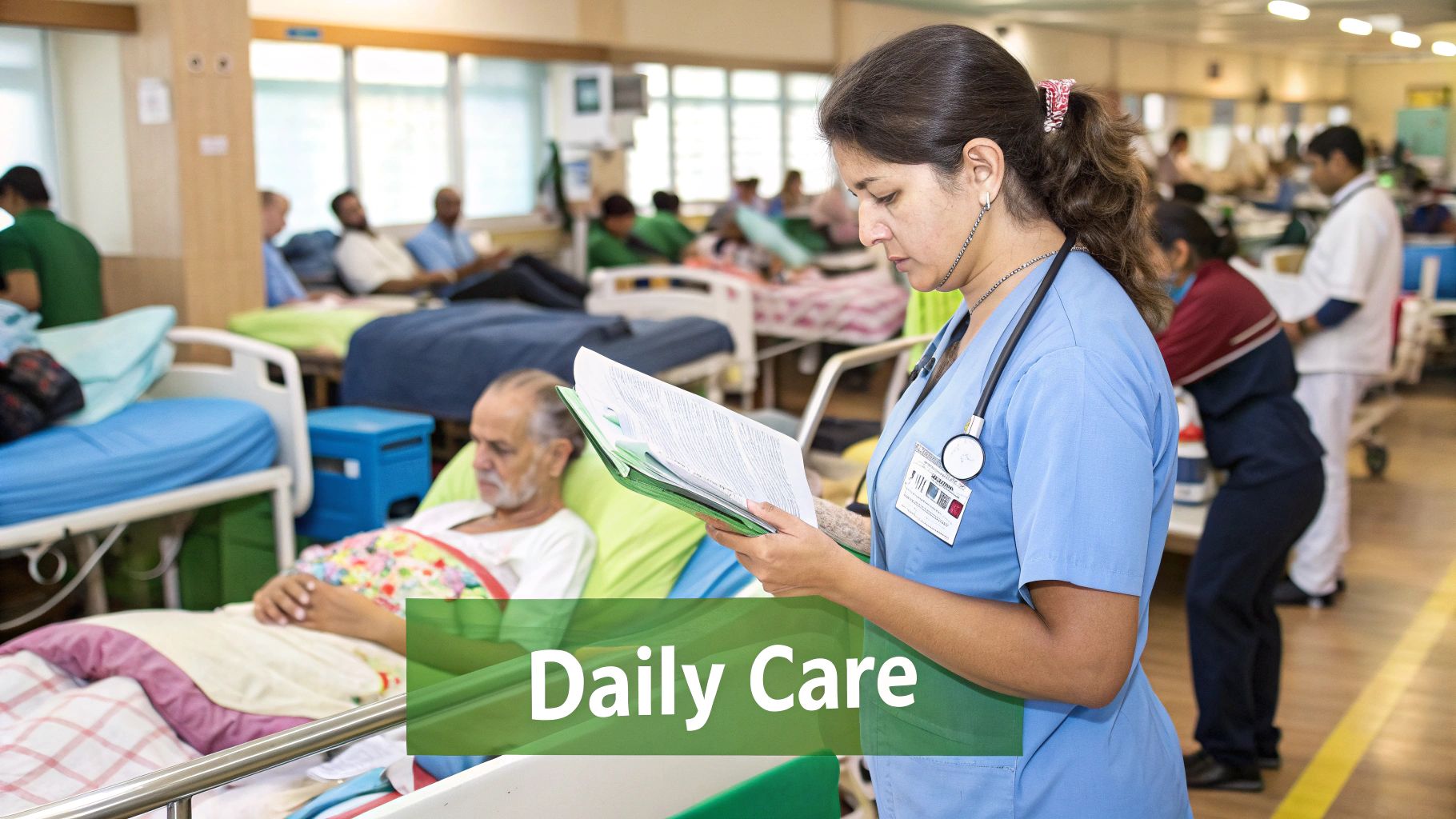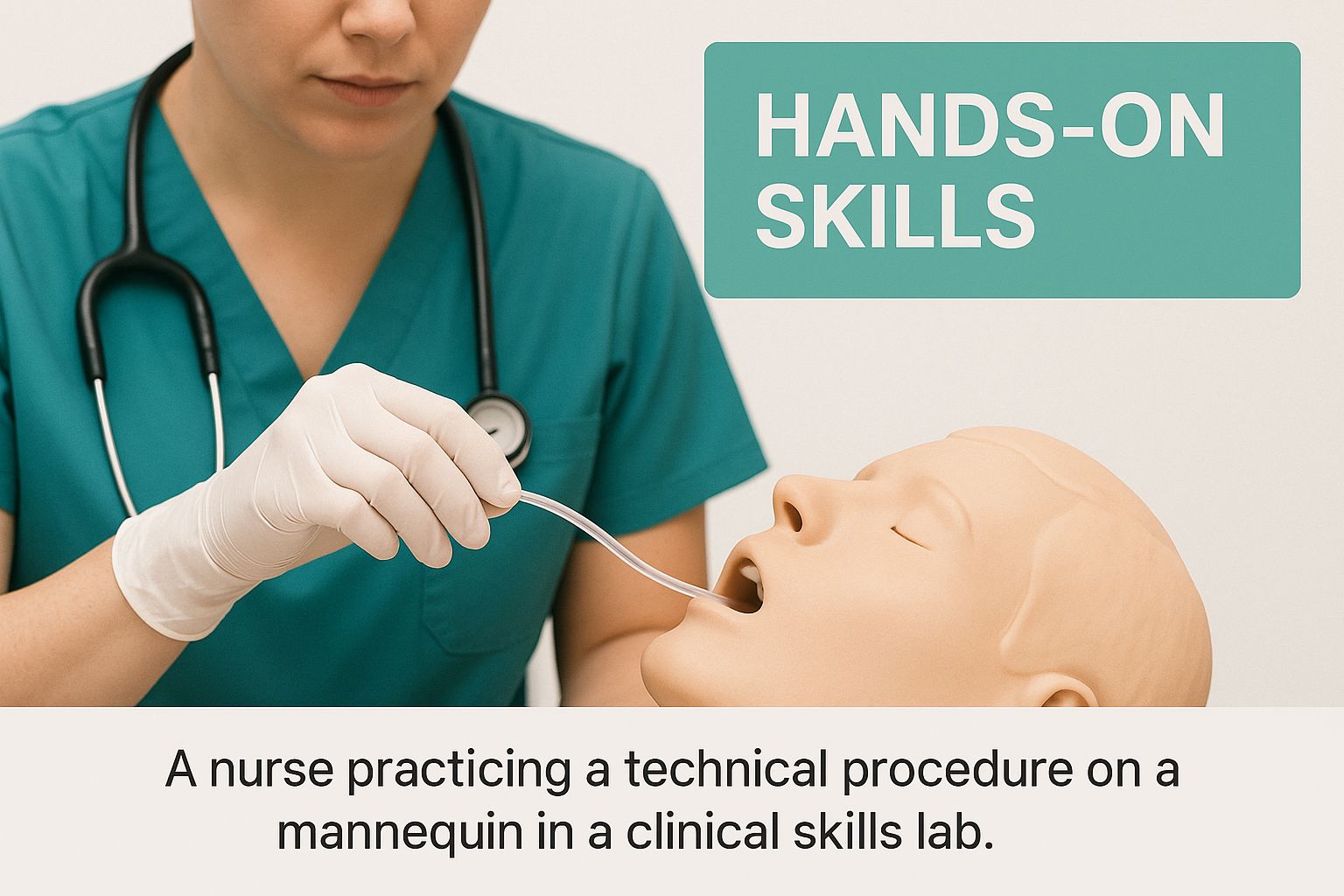
Ever wondered what a nurse really does all day? If you're picturing someone just taking temperatures and handing out pills, you're only seeing a tiny piece of the puzzle. Nurses are the heart of healthcare, blending sharp scientific knowledge with a deeply human touch. They are the professionals you see most, right at the bedside, providing hands-on care, offering a reassuring word, and making critical decisions that shape your recovery.
This guide will walk you through exactly what a nurse does, from the core duties to the many specialisations available.
Understanding a Nurse's Core Responsibilities
Think of a nurse as a healthcare detective, a patient’s strongest ally, and a trusted teacher, all rolled into one dynamic role. Their work goes far beyond administering medicine or checking vital signs. To get a real feel for what a nurse does day-in and day-out, we need to look at the core pillars of modern nursing.
These responsibilities ensure every patient gets care that looks after the whole person—not just their physical symptoms, but their emotional wellbeing and their need for information, too. It’s this complete approach that makes nursing such a crucial and respected profession.
The Four Pillars of Modern Nursing
At its heart, the nursing profession stands on four key pillars. Each one is a distinct area of responsibility, but they all connect to define a nurse's daily work and their impact on a patient's health. Understanding these pillars gives you an instant insight into just how vital their contribution is.
These aren’t just ideas; they are the practical, real-world framework guiding everything a nurse does, from a simple chat with a worried family member to a complex, life-saving procedure.
A nurse's role is to provide care that is not only clinically excellent but also deeply empathetic. They are the constant presence that ensures a patient feels safe, heard, and respected throughout their healthcare journey. This blend of skill and compassion is what defines great nursing.
Whether they're working in the fast-paced A&E of a hospital or a quiet community clinic, every nurse’s duties fit into this essential structure.
Let's break them down.
The Four Pillars of Modern Nursing
|
Pillar |
Core Responsibilities |
|---|---|
|
Clinical Care |
Performing physical exams, giving treatments and medications, monitoring patient health, and managing medical equipment. |
|
Patient Advocacy |
Ensuring patients’ rights are protected, communicating their needs to the healthcare team, and helping them navigate the system. |
|
Education |
Teaching patients and their families about health conditions, treatment plans, and preventative care to empower them. |
|
Emotional Support |
Providing comfort, empathy, and psychological support to patients and their families during stressful or difficult times. |
As you can see, the role is incredibly varied. It demands a unique mix of technical skill and genuine compassion that makes all the difference in a patient's experience.
A Day in the Life of a Hospital Nurse
To really understand what a nurse does, imagine stepping onto a busy hospital ward. The day doesn't start with a quiet coffee; it kicks off with a fast-paced, detailed handover from the night shift. This is where every patient's progress, concerns, and overnight changes are passed on with precision.

From that moment, it’s non-stop, purposeful action. The morning is a blur of patient assessments. You'll check vital signs—blood pressure, heart rate, temperature—and keep a sharp eye out for any subtle changes that might hint at a problem. This is also the time for giving scheduled medications, a task that requires intense focus as you carefully double-check every dose and patient detail to ensure safety.
Beyond the Clinical Tasks
But a nurse’s job quickly moves beyond these technical duties. One moment, you might be calming a nervous patient about to go into surgery, using empathy and clear communication to soothe their fears. Minutes later, you could be patiently explaining a new medication to an older person, making sure they and their family understand exactly how and when to take it.
The role of a nurse in the UK is a huge mix of clinical and non-clinical responsibilities, all essential for patient care. It’s everything from giving treatments and managing long-term conditions to providing vital emotional support and health education. Their work is the backbone of all healthcare settings. To learn more, you can explore more about the state of nursing in the UK.
A nurse is not just a caregiver; they are a critical thinker, a compassionate listener, and a central coordinator of care. They are the person who connects the dots between the patient, the family, and the various medical specialists.
This demands a unique set of skills. You're constantly working with doctors to refine care plans, talking to physiotherapists about a patient’s mobility, and updating health records with meticulous accuracy. Every entry is not just a team communication tool but also a legal document.
Juggling Priorities and People
A nurse’s day is a masterclass in multitasking. An alarm might sound for a patient's IV drip needing attention just as a family member approaches with urgent questions. All the while, you’re mentally preparing for the next medication round and keeping an eye on a patient who seems particularly distressed.
This constant juggling act is the essence of nursing. You have to manage competing demands with grace and efficiency, making split-second decisions that directly impact someone's wellbeing. It's a role that seamlessly blends profound empathy with sharp, life-saving skills, minute by minute, patient by patient.
Exploring Different Nursing Specialisations
The title ‘nurse’ is just the start. Think of it as opening a door to a huge world of specialised career paths, each with its own unique challenges and rewards. Understanding these different fields is key to appreciating the full scope of what a nurse does.
While every nurse shares a core foundation of skills, their day-to-day work can look completely different depending on their chosen area. Let's look at some of the most common specialisations in the UK to see just how diverse this profession is.
Adult Nursing
Adult nursing is probably what first springs to mind for most people. It’s about caring for patients from their late teens right through to old age. These nurses are on the front line, dealing with a massive range of health issues, from sudden illnesses and injuries to long-term conditions like diabetes or heart disease.
You’ll find them on busy hospital wards, in local GP surgeries, and in community health centres. The defining skill here is versatility. An adult nurse must be ready for anything, making them a master of broad clinical knowledge and quick problem-solving.
Children’s Nursing
Caring for children and young people requires a special touch. Children's nurses, or paediatric nurses, are experts in treating illnesses and injuries in patients from newborns to teenagers. They understand that a child's body isn't just a small version of an adult's and that their emotional needs are just as vital as their physical ones.
This role demands exceptional communication skills—not just to soothe a scared child, but also to support worried parents through a stressful time. You’ll see them creating safe, friendly environments in paediatric hospital wards, specialist clinics, and even schools.

Mental Health Nursing
Mental health nursing shifts the focus from physical ailments to a person's psychological and emotional wellbeing. These professionals support individuals navigating conditions like depression, anxiety, schizophrenia, and eating disorders. Their main goal is to build trusting relationships that empower patients to manage their condition and lead a fulfilling life.
Empathy and resilience are the cornerstones of this role. Mental health nurses work in many settings, from psychiatric units and community mental health teams to GP practices and even prisons. Their work involves providing therapy, administering medication, and helping people build long-term coping strategies.
Learning Disability Nursing
Learning disability nursing is a rewarding field focused on empowering people with learning disabilities to live as independently and healthily as possible. These nurses work as partners with individuals and their families, helping to break down barriers to healthcare and social inclusion.
The core of learning disability nursing is advocacy and enablement. It's about seeing the person, not the disability, and working creatively to help them achieve their personal goals and maintain their health.
This specialisation requires patience, creativity, and strong advocacy skills. Learning disability nurses often work in community teams, residential settings, and schools, providing tailored support that addresses both physical and mental health needs.
To give you a clearer picture, here is a side-by-side comparison of these roles.
Comparing Key Nursing Specialisations in the UK
|
Specialisation |
Primary Focus |
Common Work Setting |
Key Skills |
|---|---|---|---|
|
Adult Nursing |
General medical care for patients aged 18+ with acute and chronic conditions. |
Hospitals (wards, A&E), GP surgeries, community health centres. |
Versatility, broad clinical knowledge, quick decision-making, resilience. |
|
Children’s Nursing |
Holistic care for infants, children, and adolescents, including family support. |
Paediatric wards, specialist children’s hospitals, schools, community clinics. |
Excellent communication, patience, empathy, rapport with children and parents. |
|
Mental Health Nursing |
Supporting patients with psychological and emotional health conditions. |
Psychiatric units, community mental health teams, GP practices, prisons. |
Strong empathy, resilience, non-judgemental attitude, therapeutic communication. |
|
Learning Disability Nursing |
Empowering individuals with learning disabilities to live independent and healthy lives. |
Community teams, residential homes, schools, specialist clinics. |
Advocacy, patience, creativity, strong interpersonal skills, problem-solving. |
While they all fall under the 'nursing' umbrella, the day-to-day reality of each specialisation is distinct. This variety makes nursing a rich and dynamic career, with a path for almost every kind of caring personality.
The Essential Skills of a Great Nurse

What separates a good nurse from a truly great one? While qualifications get you in the door, it’s your personal qualities that truly define excellence. These ‘soft skills’ are the foundation of compassionate, effective care.
Think of it like this: anyone can learn a recipe, but a great chef adds intuition and passion. In the same way, a great nurse blends clinical knowledge with a deep sense of humanity, turning routine tasks into moments of genuine connection.
The Core Qualities of an Exceptional Nurse
Beyond the textbooks, certain personal attributes are non-negotiable for thriving in this profession. These are the skills that allow you to handle intense pressure while providing care that makes patients feel safe and looked after.
Of course, nurses must be ready for medical emergencies, making skills like mastering crucial adult CPR steps absolutely vital. But day-to-day excellence is often built on a different set of skills.
Here are the qualities that truly matter:
-
Empathy: The ability to genuinely understand and share a patient's feelings. It’s about seeing the scared person behind the medical chart and responding with kindness.
-
Resilience: Nursing is demanding. A great nurse has the mental and emotional strength to navigate high-stress situations, manage difficult outcomes, and bounce back to provide the same high level of care for the next patient.
-
Communication: Crystal-clear communication is vital. This means actively listening to a patient's concerns, explaining complex medical information in simple terms, and collaborating seamlessly with doctors and other healthcare staff.
A great nurse listens not just to what is said, but also to what is left unsaid. They notice subtle cues in body language and tone, allowing them to address fears before a patient even has to ask.
Problem-Solving Under Pressure
Finally, critical thinking and a sharp eye for detail are essential. A patient's condition can change in an instant, and you must be able to assess the situation, identify the problem, and act decisively. This often involves connecting small, seemingly unrelated details to see the bigger picture of a patient's health.
These personal attributes are the engine of quality nursing. Understanding why nursing skills will always matter is key to appreciating the depth of this profession.
How to Become a Nurse in the UK
Feeling inspired? Turning that inspiration into a career is a clear journey, and it’s more accessible than you might think. Let’s break down the roadmap from your first qualifications to your first day on the ward.
For most aspiring nurses, the journey begins with getting the right academic foundations. This usually means having GCSEs in English, Maths, and at least one Science at grade 4 (C) or above. After that, you'll typically need A-Levels or an equivalent Level 3 qualification, like an Access to Higher Education Diploma.
Finding Your Training Route
Once your foundational qualifications are sorted, the next step is applying for a nursing degree. This degree must be approved by the Nursing and Midwifery Council (NMC). The NMC is the official regulator for the profession in the UK—only graduates from their approved programmes can register and practise.
You have two main routes:
-
University Degree: This is the most common path. You’ll spend three years on a degree course that blends academic study with extensive, hands-on clinical placements in hospitals and community settings.
-
Nursing Apprenticeship: This is a fantastic option if you prefer to earn while you learn. Apprenticeships combine on-the-job training with academic study, so you gain practical experience from day one.
Gaining Experience and Registering
Whichever route you choose, clinical placements are the heart of your training. You will spend a large part of your course working alongside experienced nurses, applying what you've learned in the classroom to real-world situations. This is where you truly develop your practical skills.
After successfully finishing your degree or apprenticeship, you’ll be eligible to register with the NMC. This registration is your official licence to practise as a Registered Nurse in the UK. Once you're registered, the job hunt begins, and it's smart to learn how to prepare for nursing interviews to stand out.
Nursing is the backbone of the UK's National Health Service (NHS). As of March 2025, the NHS employed around 788,074 registered nurses. Despite this, a significant shortage remains, with over 60,000 nursing vacancies in England alone in 2024. This shows the immense and ongoing demand for new professionals.
If you're planning to move to the UK for a nursing career, understanding the financial side is essential. This includes looking into details like UK work visa costs to make your transition as smooth as possible. With a clear plan, you can turn your ambition into a deeply fulfilling career.
Got Questions About a Nurse's Role?
Let's finish by answering some of the most common questions people have about the nursing profession. Looking at the practical side gives you a much clearer picture of what the job is really like.
How Many Hours Do Nurses Work?
Officially, a standard working week in the NHS is around 37.5 hours, but it rarely feels like a typical 9-to-5. Patient care is a 24/7 operation, which means most nurses work in shifts.
This often involves long 12-hour days, nights, weekends, and public holidays. While demanding, this schedule can offer flexibility. Many nurses also pick up extra shifts to boost their earnings or help out their team.
What Does Career Progression Look Like for a Nurse?
Nursing offers a clear and satisfying career ladder. Once you qualify and become a Registered Nurse, you'll likely start as a Band 5 within the NHS structure.
From there, you can climb to more senior roles as you gain experience and complete further training. A typical path might look like this:
-
Senior Staff Nurse (Band 6): Take on more responsibility for patient care and start supervising junior team members.
-
Clinical Nurse Specialist (Band 7): Become a true expert in a specific field, like diabetes or cardiac care.
-
Nurse Consultant (Band 8): Reach the top of the clinical ladder, blending expert patient care with research, education, and leadership.
The possibilities are vast. You could specialise, pursue a Master's degree, or even move into management, research, or education.
Is Nursing an Emotionally Draining Job?
To be direct, yes. Nursing is incredibly demanding, both physically and mentally. The job involves long hours on your feet, and you will face high-stress situations dealing with patient suffering and, at times, loss.
The emotional core of nursing lies in its profound connection to human vulnerability. It requires immense strength to provide comfort in moments of sorrow, but it is also the source of the job's deepest rewards—making a tangible difference when it matters most.
But for all its challenges, it's also unbelievably rewarding. The satisfaction comes from knowing you've made a genuine difference in people's lives when they were most vulnerable. Building resilience, using self-care strategies, and leaning on a solid team are vital for thriving in this career.
Do All Nurses Work in Hospitals?
Not at all. While hospitals are the largest employers of nurses, the opportunities are quite diverse. Having the right foundational knowledge is essential. You can explore our guide on what subjects you need to become a nurse to learn more.
Nurses play crucial roles in many other settings, including:
-
GP surgeries and local health centres
-
Community care, often in patients' own homes
-
Schools and universities
-
Care homes and hospices
-
Public health organisations
This variety allows you to find a work environment that aligns with your skills, interests, and the lifestyle you want. It highlights the adaptability and value of a nursing qualification. If you're considering a career in nursing and lack the A-Levels for a nursing degree, enrol in the Access to Higher Education Diploma (Nursing) with Stonebridge College to get started.




